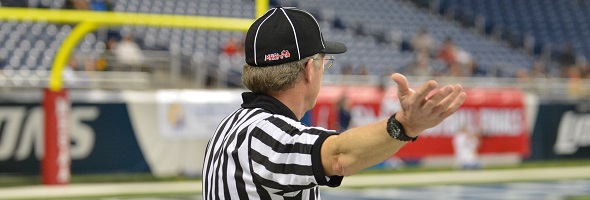
Be the Referee: Intentional Grounding
October 15, 2015
This week, MHSAA assistant director Mark Uyl explains the difference between high school and college/pro rules when it comes to intentional grounding.
Be The Referee is a series of short messages designed to help educate people on the rules of different sports, to help them better understand the art of officiating, and to recruit officials.
Below is this week's segment - Make the Call: Intentional Grounding - Listen
A QB is rolling out wide toward the sideline and is being chased by two large defenders. To avoid a certain sack, the QB throws the ball away deep down the field where no offensive receiver is even in the same zip code of where the ball hits the ground.
What’s the call?
Under high school rules, this is intentional grounding as there always has to be a receiver in the general area of the pass. At the college and pro levels, all the QB has to do is throw the ball beyond the line of scrimmage if he has scrambled outside of the tackle box. When at your next game, know this important difference when it comes to intentional grounding.

Be the Referee: Curbing Gamesmanship
September 12, 2019
This week, MHSAA officials coordinator Sam Davis explains a new rule in soccer meant to keep teams in the lead from running time off the clock by making lineup changes.
Be The Referee is a series of short messages designed to help educate people on the rules of different sports, to help them better understand the art of officiating, and to recruit officials.
Below is this week's segment - Curbing Gamesmanship By Substitution - Listen
There’s a change to high school soccer rules nationally this year designed to curb gamesmanship by a team leading a contest toward the end of a game.
In the last five minutes of regulation, or the last five minutes in the second part of overtime, a rules change this year will stop the clock when that team makes a substitution. The clock will stop even if the team that is trailing makes a substitution at the same time.
This is the same as the NCAA rules, and aims to prevent teams from making multiple substitutions in the closing moments of a game as a way to help protect their lead by running time off the clock.
Past editions
Sept. 5: Football Safety Rules Changes - Listen
Aug. 29: 40-Second Play Clock - Listen

